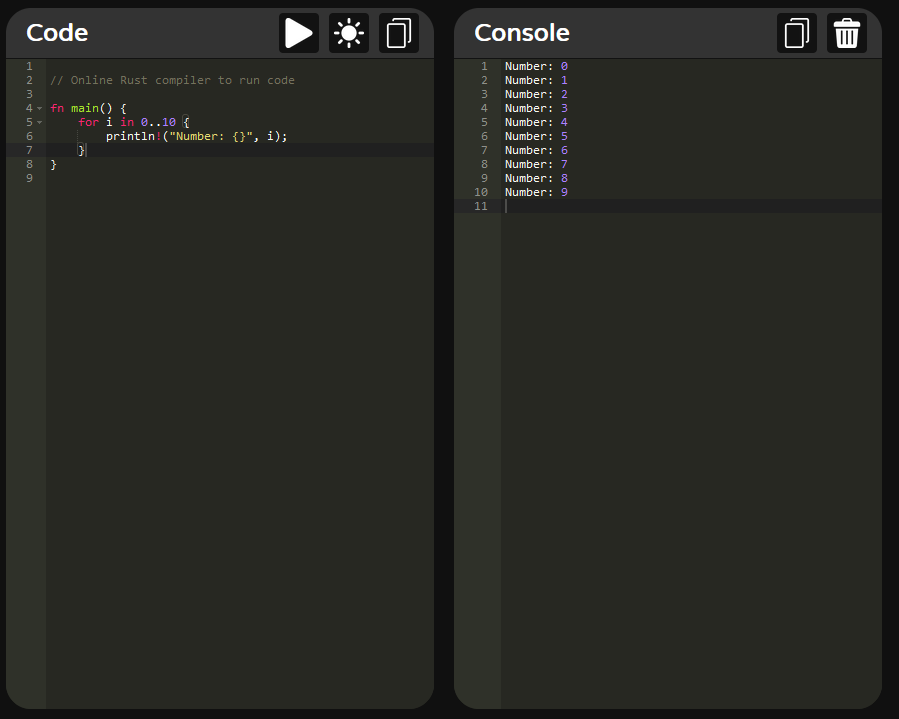How To Compile Rust Code In Your Browser
What is Rust?
Rust is a modern, systems-level programming language that prioritizes both performance and memory safety. Developed by Mozilla, Rust stands out for its strong focus on preventing common programming errors such as null pointer dereferences and buffer overflows. This is achieved through a robust ownership system that enforces strict borrowing and ownership rules. Unlike languages that rely on garbage collection for memory management, Rust's ownership system allows for precise control over memory, leading to efficient resource utilization without sacrificing safety.
One key feature of Rust is its emphasis on zero-cost abstractions, enabling developers to write high-level code that gets translated into machine-level instructions without incurring additional runtime overhead. This aspect is crucial for systems programming, where low-level control over hardware resources is often necessary. Rust achieves this by utilizing an ownership model that eliminates the need for garbage collection, making it suitable for performance-critical applications, such as operating systems, game engines, and embedded systems.
Rust also introduces the concept of lifetimes, which provides a powerful mechanism for managing references and preventing data races. The ownership and borrowing system, combined with lifetimes, ensures that programs are free from data races and memory-related bugs, enhancing code reliability. Additionally, Rust's compiler includes a comprehensive set of static analysis tools that catch potential issues at compile-time, reducing the likelihood of runtime errors and enhancing the overall stability of applications.
The language's commitment to safety does not come at the expense of expressiveness. Rust features a rich set of language constructs and abstractions, including pattern matching, algebraic data types, and a powerful trait system that enables generic programming. These features contribute to code clarity and maintainability, fostering a productive and enjoyable development experience. Overall, Rust's unique combination of performance, safety, and expressiveness makes it an attractive choice for a wide range of applications, particularly those that demand the utmost reliability and efficiency.

What is a Rust compiler?
A Rust compiler is a sophisticated tool that translates human-readable Rust source code into machine-executable code, making it a crucial component of the Rust programming ecosystem. The compiler plays a pivotal role in enforcing Rust's ownership system, lifetime management, and various safety features during the compilation process. One of the distinctive features of the Rust compiler is its ability to catch a wide range of potential errors at compile-time, reducing the likelihood of runtime bugs. This is achieved through an exhaustive set of static analysis checks, ensuring that programs adhere to the ownership and borrowing rules, resulting in memory safety and prevention of data races.
The Rust compiler operates in multiple stages, starting with lexical analysis, where the source code is tokenized into meaningful elements, followed by parsing to create an abstract syntax tree (AST). The AST represents the hierarchical structure of the code, allowing the compiler to perform semantic analysis and verify that the code adheres to Rust's language rules. The ownership system is enforced during the borrow-checking phase, where the compiler ensures that references to data are valid according to the ownership model, preventing issues such as dangling pointers and data races.
Rust's compiler also incorporates an advanced optimization pipeline to generate highly efficient machine code. Through a series of optimization passes, the compiler analyzes the code and transforms it to improve performance without sacrificing safety. This focus on "zero-cost abstractions" means that high-level constructs in Rust, such as generics and traits, do not incur additional runtime overhead. The resulting executable code is not only safe but also performs competitively with languages that sacrifice safety for raw speed.
Furthermore, Rust's compiler is an open-source project, fostering community involvement and allowing developers to contribute improvements and bug fixes. The commitment to transparency and collaboration has led to a compiler that evolves with the needs of the community and remains at the forefront of language innovation. In summary, the Rust compiler is a critical component in the Rust programming language ecosystem, ensuring that developers can write safe, performant code by leveraging a robust ownership system and a powerful set of static analysis and optimization tools.

What are the advantages of running Rust in your browser?
An online Rust compiler, sometimes called a web-based or cloud-based Rust compiler, has a number of benefits that meet a range of requirements. Accessibility is a major benefit. Developers can write, compile, and run Rust code from any internet-connected device by using an online Rust compiler. This is especially useful for people who might not have instant access to a nearby development environment or for people who want to play with Rust without having to go through a lot of setup steps. Convenient accessibility promotes inclusive learning and growth opportunities.
Code sharing and quick prototyping are two other benefits of using an online Rust compiler. Without having to build up a full Rust development environment locally, developers may test tiny code snippets, algorithms, or concepts rapidly. This makes it easier to experiment and collaborate since code can be shared via a URL or included into documentation. With features like syntax highlighting and error checking, online Rust compilers frequently offer an intuitive user interface that improves the overall development experience and frees users to concentrate on writing code rather than handling infrastructure issues.
The collaborative feature also applies to educational environments, where a Rust compiler online can be a useful teaching and learning aid. Assignments, projects, and code samples can be readily shared between teachers and students in educational settings. Furthermore, instructors have the ability to promptly offer feedback on code contributions, fostering a dynamic and captivating educational environment. Online Rust compilers are useful resources for both inexperienced developers and seasoned learners who want to explore the language's capabilities or help others advance their education because of its collaborative and accessible nature.
Online Rust compilers can also be helpful sandboxes for experimenting with new Rust versions and features. They frequently support several versions of the Rust compiler, enabling developers to verify compatibility with certain versions or experiment with the newest language improvements. For developers working on projects involving many Rust versions or those wishing to guarantee backward compatibility, this flexibility is especially helpful. To sum up, the benefits of an online Rust compiler include accessibility, quick prototyping, teamwork, and learning help, which makes it a useful tool for developers of all skill levels and situations.

What are the disadvantages of running Rust in your browser?
While online Rust compilers offer various benefits, they also come with certain limitations and disadvantages. One notable drawback is the reliance on internet connectivity. Users must have a stable internet connection to access the online compiler, which might be a hindrance in environments with limited or no internet access. This limitation can pose challenges for developers working in remote areas, on-the-go, or in situations where internet connectivity is unreliable. In such cases, a local Rust development environment might be more suitable, providing independence from online infrastructure requirements.
Additionally, online Rust compilers may have restrictions on the execution environment and available system resources. Due to security concerns and the shared nature of online platforms, compilers may impose limitations on the execution time, memory usage, or access to certain system functionalities. While these restrictions are in place to ensure the safety and security of the online environment, they can be limiting for developers working on resource-intensive or specialized tasks. In scenarios where developers require fine-grained control over the execution environment or need to interact with specific hardware features, a local Rust development setup might be preferred. In summary, while online Rust compilers provide valuable accessibility and collaboration features, developers should be aware of connectivity dependencies and potential limitations in resource utilization when choosing this option for their development needs.

How can Rust be compiled in a browser?
Rust code can be easily compiled using our free and online Rust compiler, this is a tool which allows you to run and test Rust code inside of your web browser, effectively transforming your browser into a functional Rust IDE. This compiler tool has been optimized to allow for fast execution times to simulate the speed of a local compiler, allowing you to easily run Rust code.
